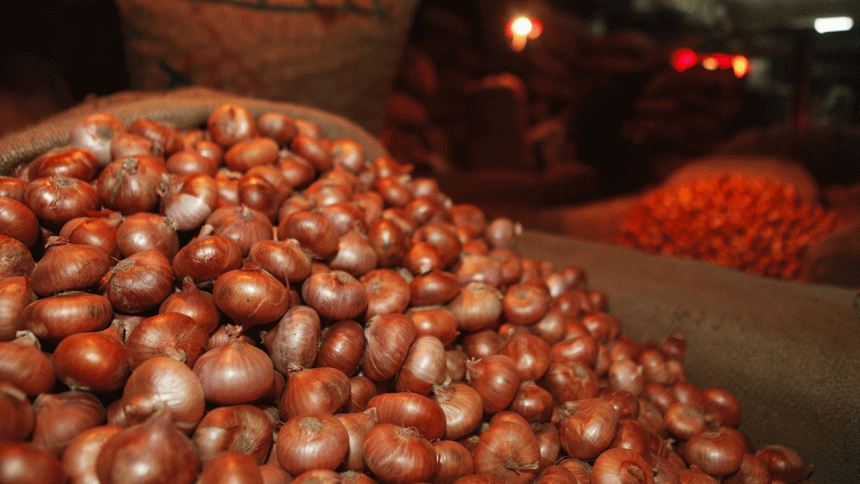Onion prices drop

Onion prices fell yesterday at both retail and wholesale markets due to an increased supply of early harvested onion and India's reduction in the minimum export price.
India re-fixed the price at $700 a tonne on January 20, nearly two months after it set the rate at $850 to rein in spiralling prices of the key cooking ingredient in its domestic market.
The new export price will remain effective till February 20, said the Indian authorities.
The neighbouring country is a major source of onion for Bangladesh.
“The onion prices fell after India's decision. The volume of arrival of the vegetable at Bhomra Land Port in Bangladesh has risen,” said Asadul Islam, an importer at the land port.
Yesterday, each kilogram of imported onion was sold for Tk 47-48, down from Tk 49-50 on Saturday. The prices will decline further, he said.
His view was echoed by Harun Ur Rashid, president of Importer and Exporter Group at Hili Land Port in the northwest district of Dinajpur.
“Many onion importers were seen opening Letters of Credit (LC) on Sunday to import onion at the reduced rate,” he said, adding that the prices will fall further in a day or two.
Narayan Chandra Saha, a wholesaler at the capital's Shyambazar market, said, “Onion prices have fallen here mainly because of plenty of supply of early varieties of local onion. It appears that growers are in a hurry to harvest their early crops fearing prices of the vegetable will drop in the coming days.”
He also pointed out that the markets in the capital are yet to be impacted by India's reduction in the export price.
Prices of locally grown onions dropped to Tk 35-42 a kg, which was Tk 40-50 on Saturday, he said.
At retail markets in the capital, each kilogram of onion was sold for Tk 50-70 yesterday, down by 11 percent from Tk 60-75 a day ago, shows the data provided by the state-run Trading Corporation of Bangladesh.
Yesterday's prices were 37 percent less than that (Tk 70-120 a kg) a month ago, according to the TCB.
A steep fall in onion prices is unlikely as untimely rains in October and November affected its plantation, said Gobinda Saha, an onion trader and stockiest in Rajbari, a major onion growing area.
Prices are expected to come down to the normal level of Tk 25-35 a kg after the main harvest starts in April, he told this correspondent.
“Favourable weather will be necessary for a good harvest and prices to return to the usual level.”
The Department of Agricultural Extension (DAE) aims to ensure plantation of onions on 2.14 lakh hectares of land in the current season compared to 2.13 lakh hectares in the previous season.
Until January 9, farmers planted onions on 93,700 hectares of land, according to DAE data.
Planting will continue till the first week of February, said a senior DAE official who sought anonymity as he was not authorised to talk to the media.
“We hope to achieve our target as farmers will grow onion on more land because of its high prices in the market,” said the official.
Traders said onion production in India impacts domestic prices of the vegetable in Bangladesh.
Indian agriculture ministry's data shows, onion production in that country is estimated to decline by 4.5 percent to 2.14 crore tonnes in the 2017-18 crop year (July to June) as against 2.24 crore tonnes last year, mainly due to less rains during the sowing period in key growing states including Maharashtra, Tamil Nadu, Karnataka and Andhra Pradesh, show.

 For all latest news, follow The Daily Star's Google News channel.
For all latest news, follow The Daily Star's Google News channel. 








Comments